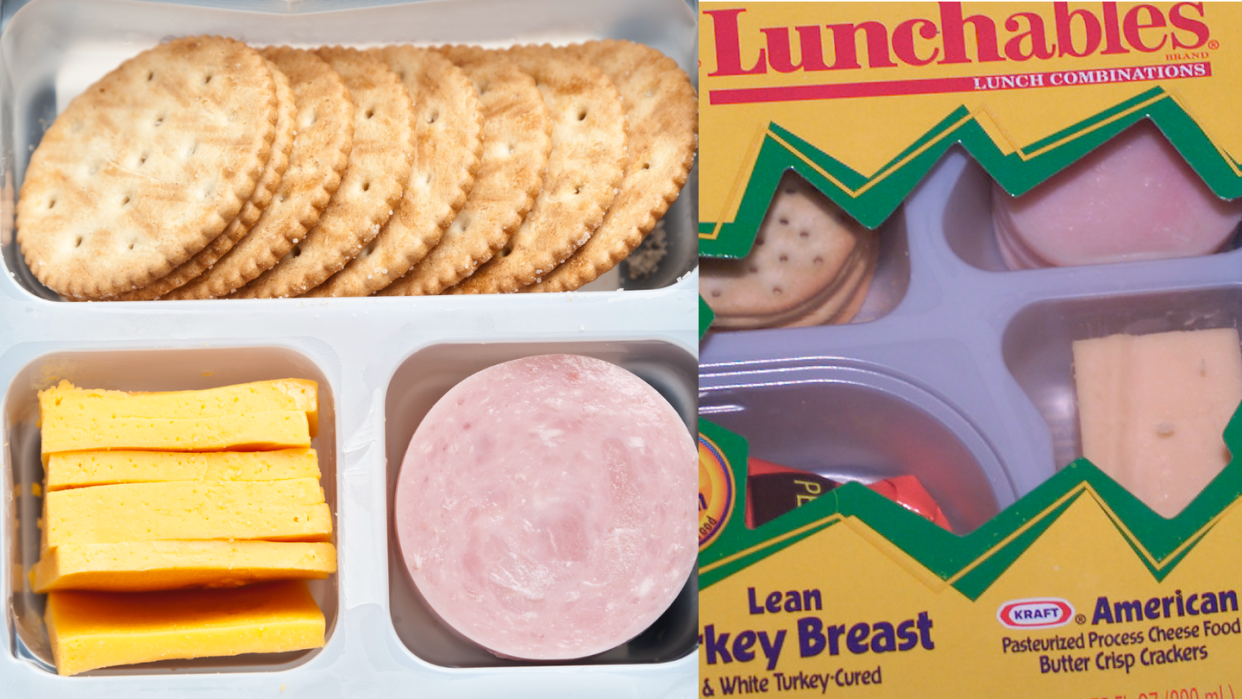Kids Shouldn't Eat Lunchables Due To 'Concerning' Levels Of Lead & Sodium, New Report Claims

Could this be the end of an era? While many of us were practically raised on Lunchables, a new study from Consumer Reports is urging schools to remove the snack boxes from school cafeterias. The advocacy group claims that the Heinz-owned product contains "concerning" levels of lead, sodium, and cadmium, and that children shouldn't be regularly eating them.
Consumer Reports tested Lunchables, along with similar prepackaged lunch kits, and found that there is "a lot to be concerned about."
"They're highly processed, and regularly eating processed meat, a main ingredient in many of those products, has been linked to increased risk of some cancers," Consumer Reports' registered dietitian Amy Keating said. They also tested snack boxes from Armour LunchMakers, Target's Good & Gather, Greenfield Natural Meat, and Oscar Mayer.
Consumer Reports found lead and other heavy metals; phthalates, which are the chemicals used to make plastic flexible and durable; and high levels of sodium, which can contribute to high blood pressure and other health concerns.
While Consumer Reports discovered worrisome levels in several of the brands' products, Lunchables by far contained the highest percentage of lead and sodium specifically. Though none of the kits exceeded legal and regulatory levels, per CBS News, five of the 12 products tested in the study would reportedly expose a person to 50 percent or more of California's maximum allowable amount of lead or heavy metals. This is especially concerning for children, considering the fact that these substances can cause developmental and other health issues in children.
Highest on the list was Lunchables' 3.2-ounce Turkey and Cheddar Cracker Stackers, which contains 74 percent of California's allowed level for lead. It also hits the 49 percent mark for the daily recommended amount of sodium for children ages four to eight.
"The kits provide only about 15 percent of the 1,600 daily calories that a typical 8-year-old requires, but that small amount of food puts them fairly close to the daily maximum limit for lead," Consumer Reports chemist Eric Boring said. "So if a child gets more than half of the daily limit for lead from so few calories, there's little room for potential exposure from other foods, drinking water or the environment."
"We don't think anybody should regularly eat these products, and they definitely shouldn't be considered a healthy school lunch," Boring added.
A spokesperson for Kraft Heinz is claims that the Lunchables "adhere to all USDA standards."
"We are extremely disappointed with the reporting from Consumer Reports and believe the results of their study are misleading, causing undue concern over the safety of our products —something we take seriously," the spokesperson told Delish in a statement. "The fact is that all Lunchables products meet strict safety standards set by government agencies. Consumer Reports admits that none of the food they tested exceeded any legal or regulatory limits, but they chose to bury that fact."
The spokesperson went on to point out that Kraft Heinz increased the amount of meat in its products to "increase protein levels and help fuel kids throughout the day." In turn, that change has "naturally elevated" sodium levels. According to the statement, Consumer Reports also did not test the brand's school-specific products, which allegedly differ from those sold in grocery stores.
"By offering Lunchables in schools, we’re able to help meet schools’ needs by giving them affordable, convenient solutions that provide students with quality nutrition at lunchtime," the spokesperson continued. "We’ve received feedback that products like Lunchables are more trusted by school administrators due to our strict food safety and quality guarantee. We see our work with schools as a solution to valid struggles schools may face."
You Might Also Like

